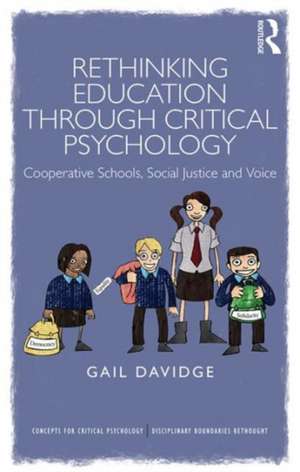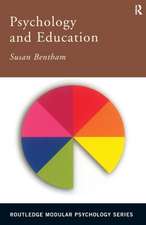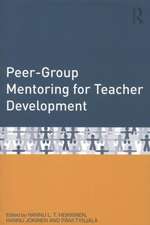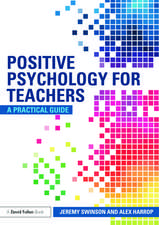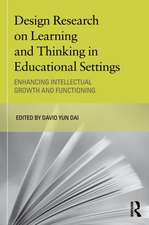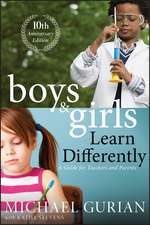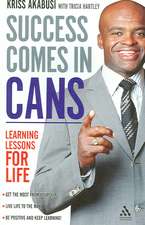Rethinking Education through Critical Psychology: Cooperative schools, social justice and voice: Concepts for Critical Psychology
Autor Gail Davidgeen Limba Engleză Paperback – 25 aug 2016
This text will appeal to advanced level undergraduate and postgraduate students, researchers and practitioners, particularly in the field of psychology, education, politics and social research, with an interest in developing a critical appreciation of inequalities in education and in reimagining the possibilities for change.
| Toate formatele și edițiile | Preț | Express |
|---|---|---|
| Paperback (1) | 345.21 lei 6-8 săpt. | |
| Taylor & Francis – 25 aug 2016 | 345.21 lei 6-8 săpt. | |
| Hardback (1) | 762.16 lei 6-8 săpt. | |
| Taylor & Francis – 24 aug 2016 | 762.16 lei 6-8 săpt. |
Din seria Concepts for Critical Psychology
-
 Preț: 295.98 lei
Preț: 295.98 lei - 5%
 Preț: 273.42 lei
Preț: 273.42 lei -
 Preț: 110.27 lei
Preț: 110.27 lei -
 Preț: 278.26 lei
Preț: 278.26 lei -
 Preț: 293.71 lei
Preț: 293.71 lei -
 Preț: 287.65 lei
Preț: 287.65 lei - 5%
 Preț: 265.17 lei
Preț: 265.17 lei -
 Preț: 294.41 lei
Preț: 294.41 lei -
 Preț: 294.72 lei
Preț: 294.72 lei -
 Preț: 285.94 lei
Preț: 285.94 lei -
 Preț: 191.32 lei
Preț: 191.32 lei - 18%
 Preț: 988.20 lei
Preț: 988.20 lei -
 Preț: 355.59 lei
Preț: 355.59 lei - 18%
 Preț: 992.90 lei
Preț: 992.90 lei -
 Preț: 377.94 lei
Preț: 377.94 lei - 5%
 Preț: 360.84 lei
Preț: 360.84 lei - 18%
 Preț: 991.76 lei
Preț: 991.76 lei -
 Preț: 345.63 lei
Preț: 345.63 lei - 17%
 Preț: 236.10 lei
Preț: 236.10 lei -
 Preț: 413.18 lei
Preț: 413.18 lei -
 Preț: 355.59 lei
Preț: 355.59 lei -
 Preț: 355.96 lei
Preț: 355.96 lei - 18%
 Preț: 986.16 lei
Preț: 986.16 lei -
 Preț: 358.44 lei
Preț: 358.44 lei - 18%
 Preț: 1148.79 lei
Preț: 1148.79 lei - 18%
 Preț: 1101.00 lei
Preț: 1101.00 lei - 18%
 Preț: 1097.85 lei
Preț: 1097.85 lei - 18%
 Preț: 1003.50 lei
Preț: 1003.50 lei -
 Preț: 360.54 lei
Preț: 360.54 lei - 17%
 Preț: 242.61 lei
Preț: 242.61 lei - 18%
 Preț: 986.63 lei
Preț: 986.63 lei -
 Preț: 358.44 lei
Preț: 358.44 lei -
 Preț: 361.44 lei
Preț: 361.44 lei -
 Preț: 342.39 lei
Preț: 342.39 lei
Preț: 345.21 lei
Nou
Puncte Express: 518
Preț estimativ în valută:
66.11€ • 68.12$ • 55.38£
66.11€ • 68.12$ • 55.38£
Carte tipărită la comandă
Livrare economică 24 februarie-10 martie
Preluare comenzi: 021 569.72.76
Specificații
ISBN-13: 9781138937741
ISBN-10: 1138937746
Pagini: 192
Dimensiuni: 138 x 216 x 17 mm
Greutate: 0.25 kg
Ediția:1
Editura: Taylor & Francis
Colecția Routledge
Seria Concepts for Critical Psychology
Locul publicării:Oxford, United Kingdom
ISBN-10: 1138937746
Pagini: 192
Dimensiuni: 138 x 216 x 17 mm
Greutate: 0.25 kg
Ediția:1
Editura: Taylor & Francis
Colecția Routledge
Seria Concepts for Critical Psychology
Locul publicării:Oxford, United Kingdom
Public țintă
Postgraduate, Professional, and UndergraduateCuprins
Acknowledgements. Series editor preface. Introduction: Navigating social (in)justice in education 1. Co-operative education re-born 2. Conceptualising a ‘co-operative’ voice 3. Making models: From ideas to action 4. Navigating co-operation 5. Putting the co-operative ‘to work’ 6. Childhood, Education and ‘Co-operation’ 7. The rupture of student voice: a non-event? 8 The end of the beginning? A cautious conclusion…
Notă biografică
Gail Davidge has over ten years’ experience as a practitioner in a variety of Primary and Early Years educational settings. She completed her PhD at the Education and Social Research Institute at Manchester Metropolitan University in the UK.
Recenzii
'Radical democratic project, quiet revolution, or an ethical brand on a shelf of the global education supermarket? In this wonderful book, Gail Davidge tells the unapologetically and delightfully messy story of how some UK schools navigate becoming "co-operative" amidst a neoliberal education marketplace where cooperation is justified through its benefits to the knowledge economy. Davidge skilfully navigates the "voices" of cooperation from illusions of equality that maintain the status quo, to a radical cooperative culture as a glimpse of equalities yet to come. This book makes a significant contribution to the theories and methods of Critical Educational Psychology.' China Mills, Lecturer in Critical Educational Psychology at the School of Education, University of Sheffield, UK
'Theoretically sophisticated and passionately argued, Gail Davidge's beautifully written book examines the Cooperative School model as, in the author's words, "a possible site of counter discourse to the 'business of usual' of contemporary schooling". More than this, the author's careful and deeply considered work offers all of us in Education (and indeed beyond) renewed hope, rekindling the belief that things can be different and that, contra Mrs Thatcher, there is an alternative.' Professor Matthew Clarke, York St John University, UK
'This is an important contribution to a debate which explores the "conditions of possibility" for democratic and progressive engagement at a time of UK public sector reform. Davidge focuses on the co-operative school project to interrogate the value of "voice" in making a "new", radical, education thinkable and considers how this may be constrained or captured by power relationships within a dominant neo-liberal paradigm. Her astute questions, robust reflections and the critical lens she applies will be thought provoking for academics, practitioners and general readers seeking to make sense of ostensibly collective models of service delivery and livelihood-making at a time of disruption and precarity.' Dr Cilla Ross, Vice Principal: Co-operative Education and Research, Co-operative College, UK
'Gail Davidge’s wonderful critical ethnography on co-operative schools in England addresses a rather ironic question: What happens when an organisation that is underpinned by values based on co-operation and mutual aid enters into a highly marketized environment driven by the values of competition and individualization? This well theorized, data rich and highly nuanced book will provoke much debate and discussion amongst academics, teachers, headteachers, policy makers and all concerned about keeping social justice on the education agenda in the current policy moment.' Professor Martin Mills, The University of Queensland, Australia
'Theoretically sophisticated and passionately argued, Gail Davidge's beautifully written book examines the Cooperative School model as, in the author's words, "a possible site of counter discourse to the 'business of usual' of contemporary schooling". More than this, the author's careful and deeply considered work offers all of us in Education (and indeed beyond) renewed hope, rekindling the belief that things can be different and that, contra Mrs Thatcher, there is an alternative.' Professor Matthew Clarke, York St John University, UK
'This is an important contribution to a debate which explores the "conditions of possibility" for democratic and progressive engagement at a time of UK public sector reform. Davidge focuses on the co-operative school project to interrogate the value of "voice" in making a "new", radical, education thinkable and considers how this may be constrained or captured by power relationships within a dominant neo-liberal paradigm. Her astute questions, robust reflections and the critical lens she applies will be thought provoking for academics, practitioners and general readers seeking to make sense of ostensibly collective models of service delivery and livelihood-making at a time of disruption and precarity.' Dr Cilla Ross, Vice Principal: Co-operative Education and Research, Co-operative College, UK
'Gail Davidge’s wonderful critical ethnography on co-operative schools in England addresses a rather ironic question: What happens when an organisation that is underpinned by values based on co-operation and mutual aid enters into a highly marketized environment driven by the values of competition and individualization? This well theorized, data rich and highly nuanced book will provoke much debate and discussion amongst academics, teachers, headteachers, policy makers and all concerned about keeping social justice on the education agenda in the current policy moment.' Professor Martin Mills, The University of Queensland, Australia
Descriere
Rethinking Education through Critical Psychology considers how participatory ways of working might inform a more critical educational psychology that takes equality and collective well-being as an alternative starting point to mapping individual achievement and ‘development’.
